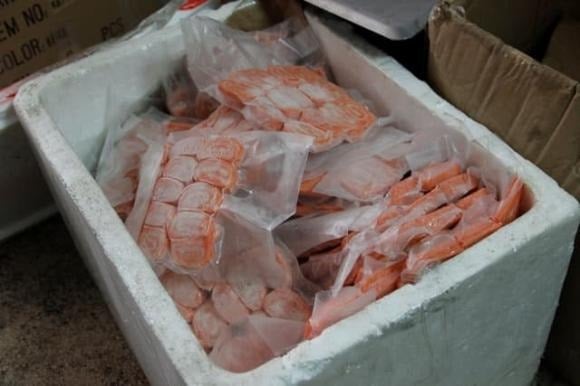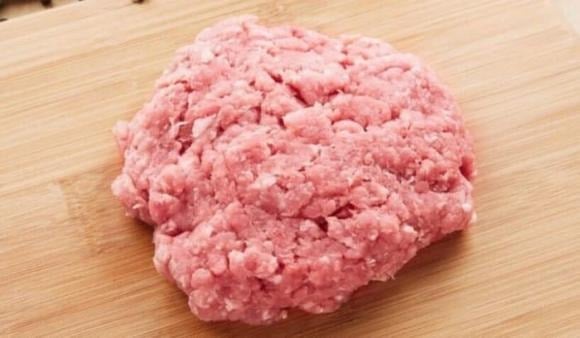As the Lunar New Year approaches, every family is concerned about stockpiling food to prepare for a cozy Tet season. However, this also requires caution and careful selection to ensure that the food brings safety and joy to the whole family.
During the last days of the year, shopping needs often increase as every family rushes to prepare for the Tet holiday. This is also the time when many stores launch the most attractive discount programs of the year.
However, not all discounted foods are the right choice. Besides the fresh and delicious foods, there are still “blacklists” that contain low-quality and unsanitary products. Here are important advice from experts on items to avoid when shopping for food during this time period.
Damaged packaging
The quality of food is often only guaranteed when the packaging is intact. If you discover torn or damaged packaging, it is best to decide not to buy. Lauren Twigge, an American nutritionist, advises: “It is best to avoid buying food when the packaging is damaged.
For example, if the bag of fries is punctured, the milk seal is leaking, or the food container is distorted… Don’t let the discount fool you, as it may be a sign that the product has expired or is contaminated, which is not safe.”

Unusual colors
If meat, produce, or bread appears unappetizing, even at a discounted price, you should reconsider your decision to purchase. Lauren Twigge notes: “If bread has green mold, meat has an unappetizing gray color… or the product has a strange flavor, it is a clear sign of spoilage. Choose fresh, vibrant meats. At the same time, make sure the meat packaging is intact, not torn, peeling, or leaking…”.
Pre-cut fruits
Although it may seem convenient and often discounted, experts recommend avoiding pre-cut fruit trays. These products can be an ideal environment for the growth of harmful bacteria, originating from the unsanitary preparation of fruits or unclean cutting utensils.
Moreover, pre-cut fruits may include spoiled portions. To maximize business efficiency, some stores may peel the fruits in advance, remove the spoiled parts, and package them as “fresh and delicious” fruit boxes. Such products can attract many bacteria and threaten the health of consumers.
Ground meat of unknown origin
Ground meat, although convenient, is not recommended for purchase on the discounted list due to three main reasons. Firstly, it is difficult to control the quality of ground meat when purchased pre-packaged. Secondly, the process of grinding meat is not disclosed, and customers do not know how the meat has been ground. Thirdly, after the meat has been ground, it cannot be washed anymore, so there is a possibility of consuming unsafe meat.

According to the QQ website (China), the ingredients for making ground meat may include various types of leftover meat mixed together. Hygiene conditions may not be guaranteed, and the ground meat may be contaminated with dust during the processing process, as well as containing unclean pig hair. Therefore, limiting the purchase of ground meat and instead choosing fresh meat is the best choice. If you decide to consume ground meat, make sure to see the meat preparation process before grinding and wash the meat under clean water.
Frozen seafood of unknown origin
According to Professor Jiang Weibo (Food Science and Nutrition Engineering at China Agricultural University), frozen seafood is one of the products that need to be considered when consumed. Seafood, if not frozen in time, can reduce nutritional value, lose attractive flavor, and increase the risk of bacterial contamination. This can affect the health of consumers. Customers often cannot determine when frozen seafood has died and whether it has been frozen immediately after death to prevent decay.
8 Common Mistakes People Make with Cutting Boards
Are you using your cutting board correctly? Many Vietnamese households rely on cutting boards in their kitchen, but not everyone knows how to use them properly, especially when it comes to wooden cutting boards. Check out these 8 mistakes to avoid when using a cutting board to ensure both hygiene and safety for everyone in your family.
Is Refrigerated Leftovers Linked to an Increased Risk of Cancer?
Dr. Lam Van Man, Head of Research, Development and Technology Transfer Department of the Institute of Safety Food, has warned of the risk of food poisoning when reheating leftovers from the refrigerator. But what should we be aware of when it comes to the possibility of these leftovers causing cancer? Here, we explore what the experts have to say on the matter and offer some tips for safe eating.





































